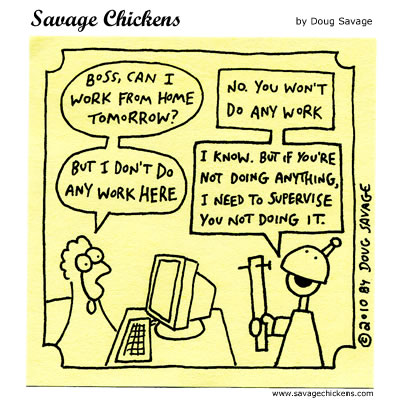I understand why Yahoo and other companies are beginning to rein in or discontinue their telecommuting programs. We’ve worked with distributed teams for over 15 years now, and honestly I still wonder if people are really doing when they are telecommuting. As I’m toiling away in the office — often the first person there and the last to leave — are they sitting around with their feet up, watching soap operas? Running errands? Going to the movies?
I’m confident the answer to all of the above is often “yes.” But these “slackers” have a significantly smaller carbon footprint, have more balanced lives and are happier. Happy, well-rounded people get more done, are more creative and stick around longer. All of that bodes well for the quality of work we’re offering our clients, and our bottom line.
Teleconferencing and instant messaging are essentially free, collaboration and project management tools are available at a low cost — so managing a distributed team has never been easier. Research everywhere shows people that telecommuters typically outperform their peers working in the office.
Our client, Lisa Brown Morton, president and CEO of Nonprofit HR, recently wrote an article in SiteProNews addressing Yahoo’s controversial derailing of telecommuting by CEO Melissa Mayer.
As I see it, there isn’t a corporation, small business or non-profit out there that can afford to ignore employee demand for workplace flexibility.
So, what’s the problem?
This is all about trust and control. If the leadership of an organization doesn’t trust its own people, telecommuting isn’t the problem. If a teleworker isn’t getting everything done that’s assigned to them, that’s management’s fault.
Discontinuing telecommuting to gain more control and to regain trust is like a slap in the face to productive employees, and an admission of failure by management.
Companies cannot afford to lose good employees by terminating telecommuting programs just because they are failing to manage the process. Have a telecommuting employee or two who aren’t producing? Deal with them independently, don’t punish the entire company.
That’s my take. What’s yours?
– – –
Image: Savage Chickens





